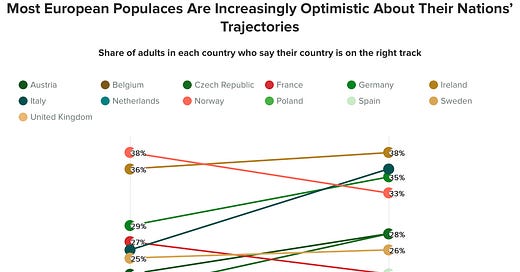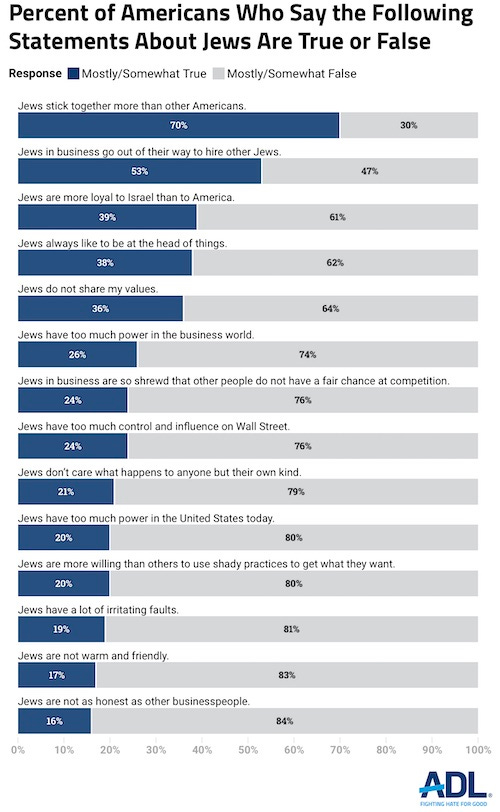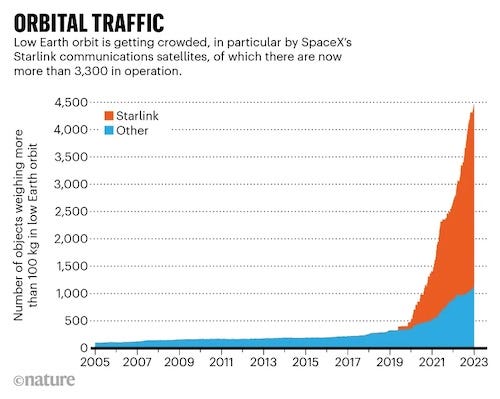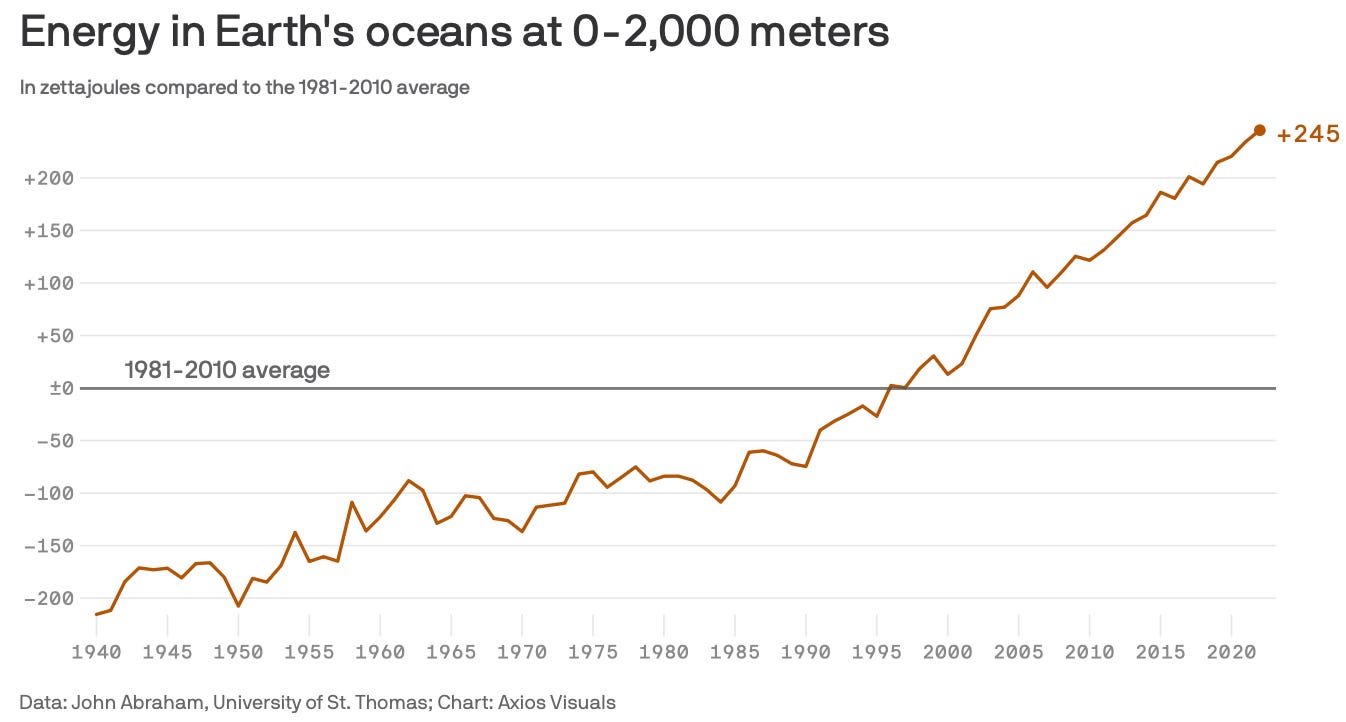Today’s posts that caught my eye:
Exxon scientists predicted global warming, even as the company publicly cast doubts, a new study published in Science found.
Just 24% of public schools feel ‘very prepared’ for active shooters.
2022 was a record year for space launches.
Know someone who should check out the newsletter? Let them!
The World
Attorney General Merrick B. Garland appointed a special counsel to investigate how classified documents had ended up in President Biden’s private office and home, opening a new legal threat to the White House and providing ammunition to its Republican opponents. Garland assigned Robert K. Hur, a veteran prosecutor who worked in the Trump administration, to examine “the possible unauthorized removal and retention of classified documents or other records discovered” at Biden’s think tank in Washington and his residence in Wilmington, Del. (New York Times)
The politics:
Biden is in a hole of his own making: President Joe Biden’s approval numbers are rising. Democrats are as loyal as they’ve been in months. Inflation is down, jobs are up, and shovels are hitting dirt on ambitious plans to fortify America’s infrastructure. And, yet, Biden is doing some digging of his own. (Politico)
But it presents a problem for MAGA Republicans. Unable to attack Biden for having documents marked classified in his possession without also faulting Trump, Republicans have tried to suggest that Biden was being treated differently than Trump is. The appointment of a special counsel undermines that. It also takes away from House Republicans the publicity they could get by investigating the issue themselves. House Speaker Kevin McCarthy said this morning that he did not “think there needs to be a special prosecutor,” and that Congress should conduct its own investigation. (Heather Cox Richardson)
South Korean President Yoon Suk-yeol announced South Korea would consider building nuclear weapons or request the U.S. to redeploy them on the Korean peninsula if North Korea's threat grows, amid concerns Pyongyang is preparing to conduct its seventh nuclear test. (New York Times)
In an extraordinary speech delivered with indignation and fiery rhetoric, Israel Supreme Court President Esther Hayut denounced the new government’s plan to radically overhaul Israel’s judicial and legal system, saying it would deal a “fatal blow” to the country’s democratic identity. Hayut declared that the sweeping changes to the legal system would fatally undermine judicial independence, give the Knesset a “blank check” to pass any legislation it pleases — even in violation of basic civil rights — and deny the courts the tools needed to serve as a check on executive power. (Times of Israel)
Residents of China are increasingly on the move after the country's sudden reversal last month of heavy COVID-19 curbs, despite a surge in infections, pointing to a gradual recovery in consumption and economic activity this year. Mobility and spending data -- from subway passenger traffic in three of China's biggest cities to flight volumes to box office collections -- show upticks since late December, after Beijing abruptly ended three years of "zero-COVID" policy earlier in the month. (Reuters)
Chinese warned not to visit elderly relatives as Covid spreads from cities: People urged ‘don’t go home’ during lunar new year holiday if older family members not yet infected. (The Guardian)
Chinese hospital says half of its staff got Covid: About half of the nearly 2,000 workers at the Beijing Hospital of Traditional Chinese Medicine got Covid-19 during the latest wave. (CNN)
Optimism Rises in Most European Nations as Natural Gas Prices Fall: Europeans in 11 of 13 nations surveyed daily by Morning Consult have become more optimistic about their nations’ trajectories over the past three months, as a mild winter and continental coordination on natural gas supplies appear to have averted the worst potential outcomes. (Morning Consult)
Routine vaccinations drop among U.S. kindergartners for the third year in a row: Vaccinations among children remain high, but the trend — with coverage dropping from about 95% in the 2019-2020 school year to 94% in 2020-2021 to 93% in 2021-2022 — has health officials concerned. Having that rate of kindergartners vaccinated against measles, for example, means that at least 250,000 kindergarteners could be unprotected. (STAT News)
U.S. Cancer Death Rate Has Dropped by a Third Since 1991: However, a rise in late-stage prostate cancer diagnoses has doctors on alert. (Wall Street Journal)
Just 24% of public schools feel ‘very prepared’ for active shooters: Only 55% of public schools said they are very prepared for suicide threats or incidents, and slightly less than a quarter (24%) said they are very prepared for active shooters. Most respondents to the November 2022 School Pulse Panel collection said they are only somewhat prepared for these situations. However, 50% of respondents reported having at least one school resource officer at their school at least once a week, signifying an increase from 45% who said the same in a comparable survey in 2017-18. (K-12 Dive)
Exxon Scientists Predicted Global Warming, Even as Company Cast Doubts, Study Finds: In the late 1970s, scientists at Exxon fitted one of the company’s supertankers with state-of-the-art equipment to measure carbon dioxide in the ocean and in the air, an early example of substantial research the oil giant conducted into the science of climate change. A new study published in the journal Science found that over the next decades, Exxon’s scientists made remarkably accurate projections of just how much burning fossil fuels would warm the planet. Their projections were as accurate, and sometimes even more so, as those of independent academic and government models. (New York Times)
Belief of Americans in antisemitic conspiracy theories and tropes has nearly doubled since 2019, an Anti-Defamation League (ADL) survey showed on Thursday. The survey asked Americans how much they agreed with statements expressing anti-Jewish tropes or conspiracy theories and found that more than half of Americans believed at least one, the New York-based advocacy group said. About 85% of Americans believed at least one anti-Jewish trope, compared with 61% in 2019, the ADL said, adding that 20% of Americans believed six or more anti-Jewish tropes, substantially more than the 11% in 2019. (Reuters)
Economy
U.S. inflation eased in December for the sixth straight month following a mid-2022 peak as the Fed aggressively raised interest rates and the economy showed signs of cooling. The consumer-price index, a measurement of what consumers pay for goods and services, rose 6.5% last month from a year earlier, down from 7.1% in November and well below a 9.1% peak in June. Core CPI, which excludes volatile energy and food prices, climbed 5.7% in December from a year earlier, easing from a 6% gain in November. Many economists see increases in core CPI as a better signal of future inflation than the overall CPI. Core prices increased at a 3.1% annualized rate in the three months ended in December, the slowest pace in more than a year and down from 7.9% in June. (Wall Street Journal)
After two straight weekly increases, the average long-term U.S. mortgage rate came back down again this week but remains a significant hurdle for many prospective homebuyers. Mortgage buyer Freddie Mac reported that the average on the benchmark 30-year rate fell to 6.33% from 6.48% last week. A year ago the average rate was 3.45%. (Associated Press)
IMF head Georgieva forecasts global growth will ‘bottom out’ in 2023: The IMF head said she expects “the trajectory of slowing global growth to reverse in the second half of 2023, possibly towards the end of 2023, and then to see in 2024 higher growth than we had in 2023”. In October, the fund forecast global growth of 2.7 per cent this year, down from their projection for a 3.2 per cent expansion in 2022. (Financial Times)
Argentina's inflation rate at 95%, highest since 1991. (Reuters)
Bank of Korea raises rates to 14-year high of 3.5%. (Nikkei Asia Review)
Wall Street’s Lucrative Leveraged-Debt Machine Is Breaking Down: Big banks are stuck with about $40 billion of risky debt on their books — blocking the M&A machine that’s enriched bankers and private-equity executives over the past decade. (Bloomberg)
This month, for the first time in the Fortune 500 list’s 68-year history, more than 10% of Fortune 500 companies are led by women. The Jan. 1, 2023 start dates of five new Fortune 500 chief executives brought the number of female CEOs up to 53, pushing the tally over the long-awaited threshold. (Broadsheet)
Europe funding dropped in 2022, but not as bad as in other regions: Venture and growth investors invested $90 billion in European startups in 2022 — marking a 25% decline from its 2021 funding peak of $119 billion. Despite the decline in funding, 2022 was still significantly higher than in prior years. (Crunchbase)
Technology
Taiwan Semiconductor Manufacturing Co. said it is considering building a second plant in Japan and is evaluating the possibility of a first in Europe as the world's largest contract chipmaker responds to customers' demands for a more geographically diverse supply chain. (Nikkei Asia Review)
Cyberattack forces Iowa’s largest school district to cancel classes: After officials from Des Moines Public Schools in Iowa noticed a cybersecurity incident on its network Monday morning, the 30,000-student district announced it would cancel classes for Tuesday and Wednesday. The district, Iowa’s largest, said it initially turned off all of its network systems “out of an abundance of caution” to resolve the incident. That included cutting off access to systems tied to transportation, building operations, health and safety, food and nutrition, finance, communications and others. (K-12 Dive)
Bitcoin mining was booming in Kazakhstan. Then it was gone. Over the past few years, dozens of bitcoin mining operations have sprung up in the city of Ekibastuz in Kazakhstan and its surrounding area, drawn by the country’s cheap power, limitless land and a surfeit of unused buildings that mines. By the summer of 2021, Kazakhstan had risen to be a bitcoin mining superpower. But the gold rush was doomed from the start. Kazakhstan’s miners eventually overloaded the country’s energy grid, causing localized blackouts, and exacerbating existing tensions. In January 2022, these issues boiled over into mass protests. Within weeks, the government effectively cut miners off from the national grid, bringing the boom to an abrupt end. It hopes it can eventually restore the industry—but the future looks highly uncertain, given the volatility in the global crypto sector. (MIT Technology Review)
2022 was a record year for space launches: In 2022, 180 rocket launches successfully reached orbit — the most ever. SpaceX launched 61 of its Falcon rockets: one every six days, on average. China had 62 launches — the second-highest number after the United States. This year could see more broken records: SpaceX hopes to conduct 100 launches. (Nature)
Smart Links
SBF publishes his version of how FTX collapsed. (SBF’s Substack)
Meal Debt Is a Growing Problem for School Districts, Survey Shows. (Education Week)
South Koreans are the world’s biggest spenders on luxury goods. (Reuters)
Abu Dhabi oil chief appointed president of COP28 climate summit. (Financial Times)
CNN's Clarissa Ward Is Pregnant, Expecting Third Baby While On-Site Covering the War in Ukraine. (People)
Ocean heat content hits record high, a sign of global warming. (Axios)
Good News
A Family Found a Hibernating Bear Under a Deck. They’re Letting It Stay. The black bear was found nesting on a bed of leaves in a crawl space of their house in Plainville, Conn., last month. A TikTok video of the bear has been viewed more than 15 million times. (New York Times)
 Tiktok failed to load.
Tiktok failed to load.Enable 3rd party cookies or use another browser
He ate at 18 Michelin-starred restaurants in a day — and set a world record. (Washington Post)


Thank you for reading my newsletter. See you Sunday!







